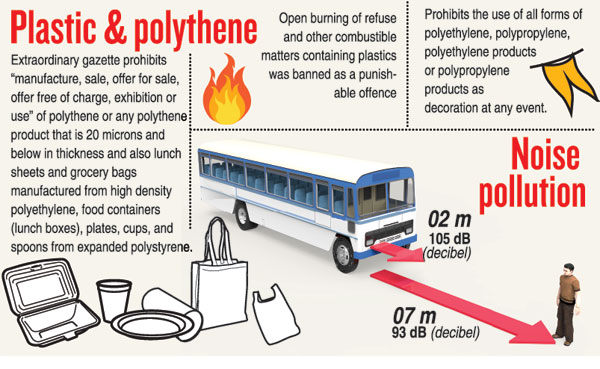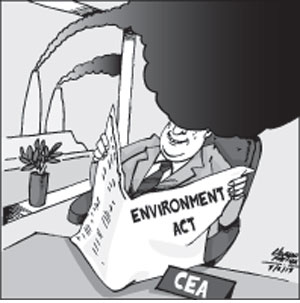News
Knee-jerk green laws fail to achieve purpose

The government last week, to mark the World Environmental Day, published a gazette notice to control emissions from all stationary sources under national environmental regulation.
Under regulation No 1 of 2019 of the Environment Act, all fugitive emissions from industrial processes, including crematoriums must be controlled through devices that reduce harmful emissions. This also includes thermal power plants, generators, boilers, incinerators, furnaces, ovens, and cement kilns.
The Central Environment Authority (CEA) said that Colombo’s air pollution index is mostly worsened by motor vehicle exhaust. According to studies, motor vehicle traffic contributes 60% of emissions, while industries contributing 10%. Households add 8% to air pollution.
In addition, two air quality monitoring stations were set up in Kandy and in Battaramulla at a cost of Rs.129 million. According to the US Air quality index, Kandy has the highest pollution with the index at 109 and Colombo follows at 46.
While the restrictions on emissions are welcomed by many experts, there are questions about implementation.
Many projects introduced by the CEA have collapsed, or abandoned due to lethargic bureaucrats.
 One such project is the Pilasuru programme (integrated solid waste management) introduced in January 2008 at a cost of Rs. 5.6 billion. It was to convert household solid waste into compost. The government had plans to set up compost centres in the 341 local authorities.
One such project is the Pilasuru programme (integrated solid waste management) introduced in January 2008 at a cost of Rs. 5.6 billion. It was to convert household solid waste into compost. The government had plans to set up compost centres in the 341 local authorities.
A CEA officer, who wished to be anonymous, said the agency had covered 143 local authorities (50%) of the country, when it had to be abandoned. This, he said, was due to the lackadaisical bureaucracy.
“During that time the waste disposal management at the Balangoda Urban Council was hailed as the best in the country, but it is no more,’’ he said.
“The administration changed and the project deteriorated,’’ he said.
Then next project was the ban on manufacture of polythene in 2017.
Although the gazette notice appeared in September 2017, the CEA started enforcement in January 2018.
Manufacturers were required to produce compostable lunch sheets and low density polyethylene shopping bags. Under this, all small and medium scale enterprises registered with the CEA said they spent millions converting their machines, but claimed there was no business.
Without enforcement, the programme failed and rogue manufacturers have moved in to make banned products.
Plenty of banned High density polyethylene (HDPE) bags are being churned out in backyards. Also, some registered companies who were into compostable lunch sheets have re-started production of banned lunch sheets.
The Polythene Manufacturers and Recyclers association’s president, Anura Wijetunge, said many companies had stopped producing compostable lunch sheets.
Another law introduced last April was aimed at controlling noise pollution from motor vehicle horns. The CEA under the direction of President Maithripala Sirisena set a 125-decibel limit. But nothing changed.
Then in March this year, came the chainsaw registration exercise.
It did not stop deforestation or illegal logging.
Environmentalists say, the forest density of Sri Lanka which was 82% in 1882 has declined to 16.5% today. A 65.5% decline in 137 years.
Prof. Palitha Weerakkody of the centre for environmental studies, Peradeniya University, said registering chainsaws is not the way to control illegal tree felling, or deforestation. Laws and enforcement are needed.
Even if there is a record of the owners of chainsaws at police stations, how is it to be determined who or where it had been used, he asked.
Also, he said that there should be a balance between felling trees and replanting.
“If there are no proper records of the number of trees cut and the number replanted, the balance cannot be maintained. Natural forests are encroached on and nothing is done,’’ he said.

